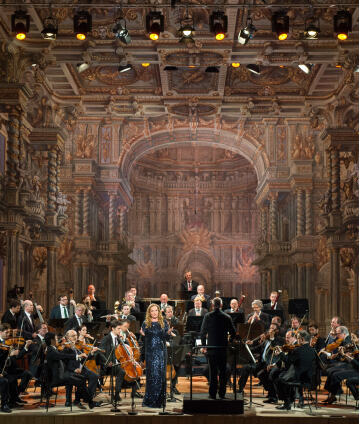2018 Europakonzert from Bayreuth with Paavo Järvi and Eva-Maria Westbroek

An architectural gem is the venue for this Europakonzert: the Margravial Opera House in Bayreuth, one of the few originally preserved theatrical buildings of the Baroque. Paavo Järvi, who has caused a sensation particularly for his interpretations of Beethoven, conducts the composer’s Fourth Symphony, and of course Richard Wagner could not be missed out in a Bayreuth concert either. The soloist in his Wesendonck Lieder is Eva-Maria Westbroek.
In 1872, Richard Wagner conducted Beethoven’s Ninth Symphony at the beautiful Margravial Opera House in Bayreuth to mark the ceremonial laying of the foundation stone of his Festspielhaus. When the Berliner Philharmoniker perform works by Ludwig van Beethoven and Richard Wagner at the same venue for their traditional Europakonzert conducted by Paavo Järvi on 1 May 2018, their programme makes reference to both the history of the city and its Baroque theatre. Built in wood in the middle of the 18th century, the opera house, which even Wagner temporarily considered as a venue for his festival, is one of the few original theatre buildings of the era. In 2012, the building became a UNESCO World Heritage Site. The Philharmoniker’s concert is one of the first public events after its reopening following several years of renovation work.
Beethoven’s Fourth, in contrast to its symphonic neighbours numbers three (the Eroica) and five, has not been burdened by expansive attempts by posterity to explain its meaning. In its ingenious escalation of contrasts, the humorous alternation of its main beat, the interplay of rhythmic and melodic motifs, it represents a consummate and yet still somewhat underrated masterpiece.
The period of over ten years that it took Beethoven to complete Fidelio, his one and only opera, demonstrates the difficulties he had with the genre. In total, three versions and even four overtures have been handed down. The third, which Järvi and the Berliner Philharmoniker will perform, is the longest and represents a miniature musical drama. Moreover, the use of the main themes of Leonore and Florestan, the main characters of the opera, already looks ahead to Wagner’s leitmotif technique.
While the themes of Beethoven’s Fidelio are loyalty and conjugal love, Wagner’s Wesendonck Lieder were inspired by an extramarital passion: in the 1850s, Otto Wesendonck granted asylum in his Zurich home to the composer, who was politically persecuted in Germany. Wagner and Otto’s wife Mathilde soon fell in love. Although the relationship allegedly remained platonic, it ended in a scandal when Wagner’s then wife, Minna, intercepted an ambiguous letter. The love story is regarded as the nucleus of the opera Tristan and Isolde whose libretto was written in this period. The composer also wrote settings of five of Mathilde’s poems which already echo some of the musical themes of Tristan.
For the first time, the Europakonzert will be conducted by Paavo Järvi, who caused a sensation not least with his recordings of Beethoven’s symphonies. The soloist is a seasoned Bayreuth performer, the soprano Eva-Maria Westbroek – a singer who in the role of Isolde among others, has already given unforgettable performances together with the Berliner Philharmoniker.
© 2018 EuroArts Music International
Categories
Artists
Our recommendations
- 1994 Europakonzert from Meiningen with Claudio Abbado and Daniel Barenboim
- 2025 Europakonzert from Bari with Riccardo Muti
- 2005 Europakonzert from Budapest with Simon Rattle and Leonidas Kavakos
- 2003 Europakonzert from Lisbon with Pierre Boulez and Maria João Pires
- 2023 Europakonzert from Barcelona with Kirill Petrenko
- 2007 Europakonzert from Berlin with Simon Rattle, Lisa Batiashvili and Truls Mørk